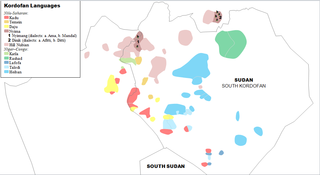Related Research Articles

The Panchen Lama, is a tulku of the Gelug school of Tibetan Buddhism. Panchen Lama is one of the most important figures in the Gelug tradition, with its spiritual authority second only to Dalai Lama. "Panchen" is a portmanteau of "Pandita" and "Chenpo", meaning "Great scholar".

In most classifications, the Eastern Sudanic languages are a group of nine families of languages that may constitute a branch of the Nilo-Saharan language family. Eastern Sudanic languages are spoken from southern Egypt to northern Tanzania.

Chamdo is a prefecture-level city in the eastern part of the Tibet Autonomous Region, China. Its seat is the town of Chengguan in Karuo District. Chamdo is Tibet's third largest city after Lhasa and Shigatse.

The 11th Panchen Lama controversy is a dispute about the current legitimate holder of the Panchen Lama title, a political and religious leadership position in Tibet and Tibetan Buddhism. After the death of the 10th Panchen Lama, a dispute between the Chinese leadership and the exiled 14th Dalai Lama resulted in two competing candidates. The search committee process involving monks in Tibet under the strict supervision of the Chinese communist regime was disrupted when the Dalai Lama, according to the Tibetan tradition, unilaterally announced his selection of Gedhun Choekyi Nyima. The leadership in China took Nyima and his family into custody, allegedly to prevent his being taken to India by the Dalai Lama's supporters, and reverted to the Qing Dynasty's Golden Urn process to select Gyaincain Norbu. Neither Nyima nor his family has been seen since the abduction.

Gedhun Choekyi Nyima is the 11th Panchen Lama of Tibetan Buddhism according to the Dalai Lama. He was declared the 11th Panchen Lama by the 14th Dalai Lama on 14 May 1995. He was rejected by the search team appointed by the State Council of the People's Republic of China. He was born in Lhari County, Tibet Autonomous Region. After his selection, he was taken into what the PRC government described as protective custody and has not been acknowledged in public since 17 May 1995.
Palden Tenpai Nyima (1782–1853) was the seventh Panchen Lama of Tibet.

Nyima County is the westernmost county-level division under the administration of the prefecture-level city of Nagqu, Tibet Autonomous Region, People's Republic of China. The northern part of the county is within the Changtang area.
Zhang-Zhung is an extinct Sino-Tibetan language that was spoken in what is now western Tibet. It is attested in a bilingual text called A Cavern of Treasures and several shorter texts.
The Blue Annals, completed in 1476, written by Gö Lotsawa Zhönnu-pel, is a Tibetan historical survey with a marked ecumenical view, focusing on the dissemination of various sectarian spiritual traditions throughout Tibet.
Nyima may refer to:
The Northern Eastern Sudanic, Eastern k Sudanic, Ek Sudanic, NNT or Astaboran languages may form a primary division of the yet-to-be-demonstrated Eastern Sudanic family. They are characterised by having a /k/ in the first person singular pronoun "I/me", as opposed to the Southern Eastern Sudanic languages, which have an /n/. Nyima has yet to be conclusively linked to the other languages, and would appear to be the closest relative of Ek Sudanic rather than Ek Sudanic proper.

The Nyima languages are a pair of languages of Sudan spoken by the Nyimang of the Nuba Mountains that appear to be most closely related to the Eastern Sudanic languages, especially the northern group of Nubian, Nara and Tama.

Chökyi Nyima Rinpoche is a Tibetan Buddhist teacher and meditation master. He is the abbot of Ka-Nying Shedrub Ling Monastery in Kathmandu, Nepal. He is the author of several books, founder of meditation centers around the world, and acclaimed teacher teaching internationally.

Ka-Nying Shedrub Ling is a Tibetan Buddhist monastery near Boudhanath, on the outskirts of Kathmandu, Nepal. It has ties to both the Kagyu and Nyingma schools, hence the combined Ka-Nying in the name. Shedrub Ling means “sanctuary for learning and practice.”
Basum is a divergent Bodish language spoken by about 2,500 people in Gongbo'gyamda County 工布江达县, Nyingtri Prefecture, Tibet, China. Basum is spoken by 13.5% of the population of Gongbo'gyamda County. Glottolog lists Basum as unclassified within Bodish.

The Nuba Mountains, located in the West Kordofan and South Kordofan states in the south of Sudan, are inhabited by a diverse set of populations speaking various languages not closely related to one another.
Lamo is an unclassified Sino-Tibetan language spoken in Tshawarong, Zogang County, Chamdo Prefecture, Tibet. It was recently documented by Suzuki & Nyima (2016). sMad skad, a closely related language variety, is also spoken in Tshawarong.
Larong or Zlarong is a recently documented Sino-Tibetan language spoken in Zogang and Markam counties of southeastern Chamdo, Tibet. It was recently documented by Zhao (2018) and Suzuki & Nyima (2018). Zhao (2018) tentatively classifies Zlarong as a Qiangic language.
Drag-yab is a Sino-Tibetan language recently documented by Suzuki & Nyima. It is spoken in the southern half of Zhag'yab County, Chamdo, eastern Tibet.
The Chamdo languages are a group of recently discovered, closely related Sino-Tibetan languages spoken in Chamdo Prefecture, Tibet. Their position within the Sino-Tibetan language family is currently uncertain.
References
- ↑ Nyima at Ethnologue (18th ed., 2015)
- ↑ Hammarström, Harald; Forkel, Robert; Haspelmath, Martin, eds. (2017). "Lenyima". Glottolog 3.0 . Jena, Germany: Max Planck Institute for the Science of Human History.
| This article about Cross River languages is a stub. You can help Wikipedia by expanding it. |